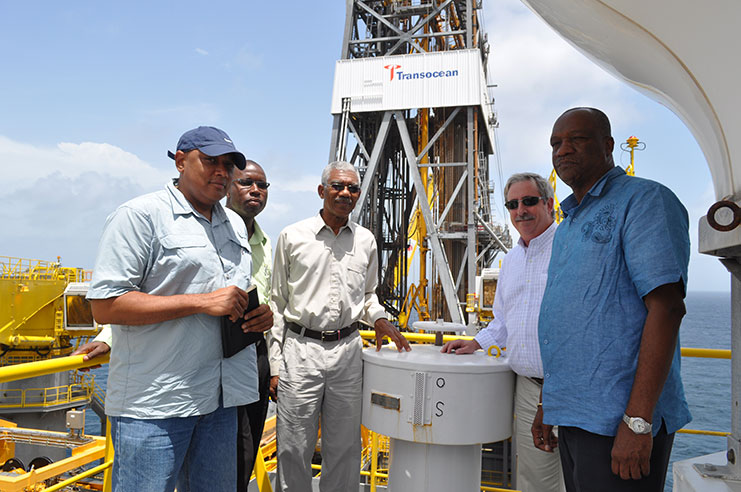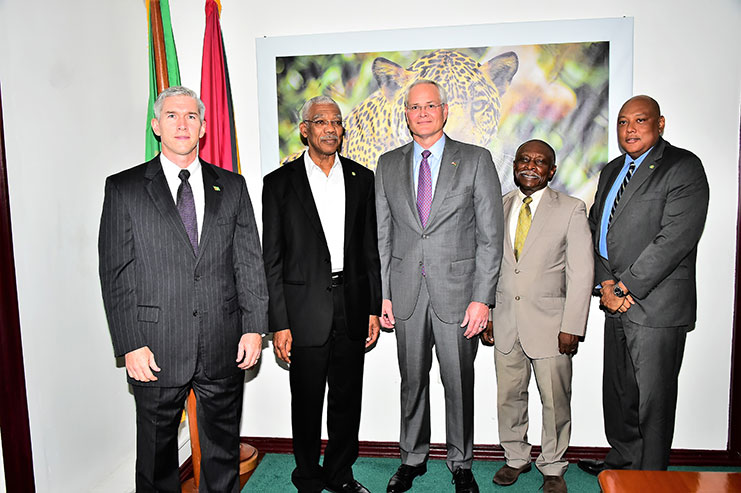Something new with endless possibilities
A simple look at oil-rich nations around the world would show that despite the possible negative impacts, a strong, well-managed oil and gas sector can transform the socio-economic landscape of a country. This is precisely why Guyanese, by and large, are optimistic for 2019/2020 when oil giant, Exxon Mobil will commence production of oil in Guyana; thereby realising a dream that is shared by generations of Guyanese. With a booming natural resources sector, it is incumbent on Government to ensure that tenets of transparency, good governance and accountability are steadfastly adhered to.
President David Granger is on record, committing his Government to the development of the sector in a manner would allow for all of Guyana’s people to benefit equally and in an environment of complete transparency and trust. Moreover, he assured of full involvement of all relevant stakeholders, including the Parliamentary Opposition, in the process.

TRANSPARENCY
During a meeting with top executives of Exxon Mobil, President Granger said that, “We are committed to the norm of transparency…so that we can move forward at a domestic level, not only in an atmosphere of transparency but trust so that all Guyana would see this not as a short-term bonanza; so that Guyanese will see this as a national industry… In this regard, we are walking step by step as the developments take place offshore, and the developments in terms of our legislations within our regulatory framework in terms of the passage of information to various stakeholders in Guyana and the diaspora so that we can create an environment, which is stable and secure.”
Thus far, the Government has taken all the necessary steps to ensure that sector is properly managed. These efforts were recognised by the international community and as a result, Guyana’s application to the Extractive Industries Transparency Initiative (EITI) for candidateship was approved. The country, through the Ministry of Natural Resources, has been working with the Inter-American Development Bank, the World Bank and the International Monetary Fund to develop a framework to ensure that this new industry is properly managed.
Moreover, the Ministry has also been engaged with the Commonwealth Secretariat to craft a strong regulatory and legal architecture for the management of the oil and gas sector. In this regard, Minister of Natural Resources, Mr. Raphael Trotman has tabled the Petroleum Commission Bill of 2017, which is currently being reviewed at the level of a Parliamentary Select Committee. That Bill seeks to provide for the establishment and functions of the Petroleum Commission of Guyana and for related matters.
The provisions of that Bill, however, has come in for some criticism, particularly as it relates to the powers it proposes to confer on the Minister. One particular provision of the Bill that has come under scrutiny is the Minister’s authority to select and appoint both members of the Petroleum Commission as well as the Petroleum Board. In this regard, Minister Trotman said that “we are looking for objective criticisms and objective critiques as to how to make this Bill better and so we are hoping to re-engage the Commonwealth Secretariat later in November to sit again and to do further work… We want a nationally accepted Bill. We have been listening to the comments and criticisms and I can assure the Guyanese people that they are going to be changes in the Bill.”

More recently, there have been calls on the Government to release details in relation to a US $20M signing bonus agreement between the country and Exxon Mobil, as well as the full details of the contract. Supporting those calls, Dr. Mangal said that the people need to have confidence in their representative and this can only happen through transparency, which they should demand.
Government remains committed to transparency and the national interest and Minister Trotman clarified that the Administration of which he is a part, has no intention of operating under a shroud of secrecy when it comes to its engagements with any company that is looking to invest in Guyana’s extractive industry or any industry for that matter. However, there is a number of extenuating and external issues, which must be addressed before certain information can be released. Failing to adhere to certain contractual clauses can have serious legal repercussions, a fact that is well-known in the legal fraternity and others who are au fait with certain contractual procedures.
“Some of them have foreign affairs implications, some of them have sovereignty implications, some have national security implications and Government has been advised by external advisors and lawyers that at this point in time, that we should not bare all. It is perhaps not palatable to everyone to accept that and sometimes advice is not always what you want to hear,” the Minister said.
He noted that while this legitimate constraint might be less than desirable, it is necessary for the Government to heed the advice of experts and abide by certain safeguards that have been out in place protect national interests. Minister Trotman assured that in due course, Cabinet will be able to remove this temporary injunction and make a full disclosure to the Guyanese public.

“There is nothing in there that could sink anyone or sink a Government. As a matter of fact, I have said that often times, it is really a continuation of a 1999 contract and it was tweaked in just a few places and so there is nothing to hide as such… We have been advised that at this juncture, as a country, we ought not to lay our contracts bare and one has to understand as well that there is a contract with ExxonMobil but there are a number of other contracts with other operators that this Government inherited and so it is not a matter of just releasing one contract,” he explained.
WHAT’S IN IT FOR US?
Minister of Public Infrastructure, Mr. David Patterson, in a special interview with Government in Action, said that people in other parts of the world are somewhat startled at the lack of enthusiasm displayed by some sections of Guyanese society over this major development. He explained that this is simply because citizens, particularly those of a certain age, have been hearing about the country’s oil potential for years but nothing ever came of those talks until now. “We’ve never experienced that before so to us it’s a myth. But it is coming, it’s proven and when something is declared proven in this industry, it means that it’s sure and it’s guaranteed… It’s like a pay cheque at the end of the month if you are working,” he explained.
One of the reasons Guyanese may not be showing the level of interest one would expect is because many of them are not sure how they stand to benefit from this new stream of revenue that will begin flowing into the country.
Making reference to the Local Content Law, Minister Patterson reminded that Guyanese are an equal partner in this new venture, which means that the ancillary services required as production commences, must and will have an impact on the local economy. This means that Guyanese businesses must be given first preference, so for example, if there is a need for transportation or catering services explained that local companies will be the first option.
“You have to hire a Guyanese company. The only way you can hire a foreign company is if there’s no Guyanese company available. If you’re going to get food for your ships, the first call should be Guyanese companies. So, in every little facet of our lives, there’s going to a change. We have to prepare for it… Take food for example, while the Local Content Law may direct you to a local food producer, international regulations dictate that companies must be certified. So not because you’re local it will guarantee you the job unless you’re certified,” Minister Patterson explained.
In this regard, Minister Patterson is urging citizens to make all the necessary preparations by mid-2019, at which time several vessels will be offshore Guyana and work will commence in full swing. Moreover, he reminded that with an unprecedented increase in revenue, the Government will be able to much more for citizens in terms of investment in healthcare, social services, education and infrastructure.
Speaking of infrastructure, Minister Patterson informed that with oil revenue, one of the areas that will receive urgent attention is the country’s power supply system.
He explained that the use of natural gasses to power generators on the coast will be much more cost-effective than harnessing hydropower and as such, the Government will be moving in this direction to explore its options. Additionally, road networks and bridges are on the cards.
“If you live on the East Bank or if you live over on the West Coast, you would know that traversing there in the mornings is an act of patience and sometimes frustration and there are just so many cars on the road and our network is just simply stretched to the limit… If one bridge in the City goes down or there is an accident, it backs up traffic in the entire city. So obviously we have to improve our infrastructure and do it quickly. It is anticipated within the next three to five years, the amount of persons and the amount of commerce that will be operating in Guyana will be increased by three or four fold and if we don’t have the infrastructure in place to accommodate that we will obviously be promoting gridlock so that is something that we are looking at,” Minister Patterson said.
Additionally, the Government has long spoken about linking the hinterland to the coast and with oil revenues coming on stream this initiative has become more possible than ever before.

In terms of job creation, Presidential Advisor on Petroleum, Dr. Jan Mangal explained that Guyana is basically starting at ground zero as it relates to developing an oil and gas sector and, therefore, at this stage, capacity-building across all sectors is key.
“The most important resource is not the oil resource; it’s the human resource, the human capacity. Nothing will get done without people. Nothing will get done without appropriately qualified people,” he said. Nevertheless, Dr. Mangal reminded that quite apart from the areas requiring a high-level of technical expertise, a wide variety of other jobs will open up for Guyanese as an offshoot of the development of the oil and gas sector and as such citizens must hone their skills in preparation for those opportunities that will be made available as the date draws close to actual production.
To this end, Minister Patterson informed that his Ministry has embarked on a process of training and retraining civil, structural engineers and other technical officers for when oil and gas come on stream. They have been attending various seminars and granted scholarship programmes. He explained, however, that with any technical experts that may be brought into the country, there will have to be a system in place to allow for technology transfer.
“This means if you come, you must partner with a local agency so that in a very short time our locals have all the capacity needed to service the oil and gas industry. Over time, I think we will be there, we have three years to prepare for before first oil production and we’re going to use that beneficially,” he said.
This Minister also issued a call to the private sector to also develop their capacities so that they will be a position to seize opportunities that the new sector will bring. “You could have started your career as a lawyer and you can do a training course to become a lawyer that could serve in the oil and gas industry. The same with the engineers, you don’t have to start all over again to become an engineer that could work in the oil and gas sector. So what the private sector has to do is to see which market that they would tap into and train their workers and invest in their people. We have some of the brightest youths and the best in the Caribbean. The Government cannot do it all but jointly, we can overcome all of the hurdles we have at this moment,” the Minister said.
Next week, we will continue our discussions on this important sector by examining its prospects and risks in so far as it relates to a green development trajectory





.jpg)








